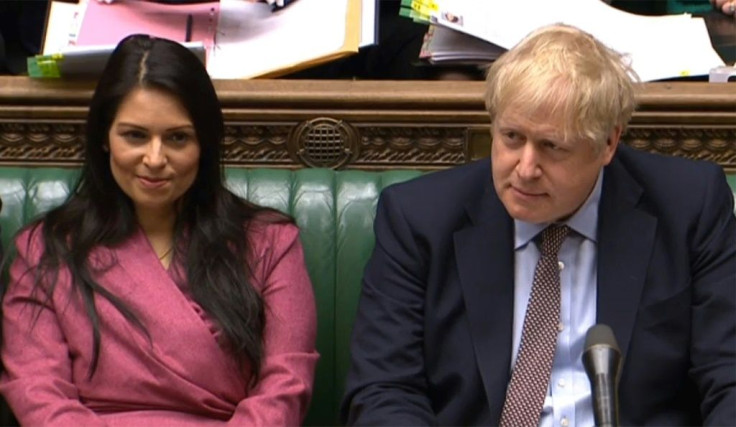UK PM Stands By Key Ally Despite Bullying Revelations
British Prime Minister Boris Johnson on Friday stood by his interior minister, a hardline ally in the Brexiteer government, resisting calls for her resignation after an official finding that she may have bullied staff.
Johnson overruled his adviser on ministerial standards, Alex Allan, who concluded in a long-awaited report that Home Secretary Priti Patel had "not consistently met the high standards expected of her".
"Her approach on occasions has amounted to behaviour that can be described as bullying in terms of the impact felt by individuals," he wrote.
"To that extent, her behaviour has been in breach of the Ministerial Code, even if unintentionally."
Johnson said he had "full confidence" in Patel, a prominent right-wing ally and leading Brexit supporter, and considered the matter closed.
"He loathes bullying. He takes it very seriously. He doesn't believe that Priti Patel is a bully," his press secretary Allegra Stratton told reporters, pointing to her expressions of regret.
Allan quit in protest after Johnson rejected his findings on Patel. Breaches of the cabinet code normally entail a minister's resignation, and opposition parties were scathing.
"It is hard to imagine another workplace in the UK where this behaviour would be condoned by those at the top," said Labour party leader Keir Starmer.
Ed Davey, who leads the smaller Liberal Democrats, said Johnson should have sacked Patel for breaking the code.
"He seems to believe there is one rule for him and his allies and another rule for everyone else. That is unacceptable," he added.

The report into Patel's behaviour came at the end of Anti-Bullying Week, a campaign observed by schools across the country, and a torrid few days for Johnson in which he had tried to refocus his under-fire administration.
Last week he lost another abrasive ally, top adviser and "Brexit Brain" Dominic Cummings, whom Johnson also refused to sack despite public fury at his breach of coronavirus rules earlier this year.
Patel herself apologised and said she was "sorry that my behaviour in the past has upset people", and thanked Johnson for his support.
"It has never been my intention to cause upset to anyone," she added, admitting that sometimes she was "direct and have at times got frustrated".
Patel, whose brief includes key counter-terrorism, immigration, crime and policing policy, had previously been sacked in 2017 for breaking the ministerial code.
Johnson's predecessor Theresa May fired her as international development secretary after it emerged she held 12 undeclared secret meetings with Israeli officials while on holiday.
She has been living under a cloud since February, when her powerful department's top civil servant, Philip Rutnam, quit and announced legal action for constructive dismissal.
He blew the whistle on allegations by staff that her conduct "included shouting and swearing, belittling people, making unreasonable and repeated demands".
One official serving under Patel when she was an employment minister in 2015 took an overdose of prescription drugs after Patel had harangued her, the BBC reported in March.
More recently at the Home Office, another official who had worked all night to prevent delays in an extradition flight of illegal immigrants collapsed after a meeting with Patel, according to The Times.
Johnson has been accused of a cover-up by failing to publish the findings for at least two months and was bounced into it after outlines of Allan's report were leaked to The Times.
But the government said it would not be publishing the report in full, arguing named individuals had a right to confidentiality.
© Copyright AFP {{Year}}. All rights reserved.





















